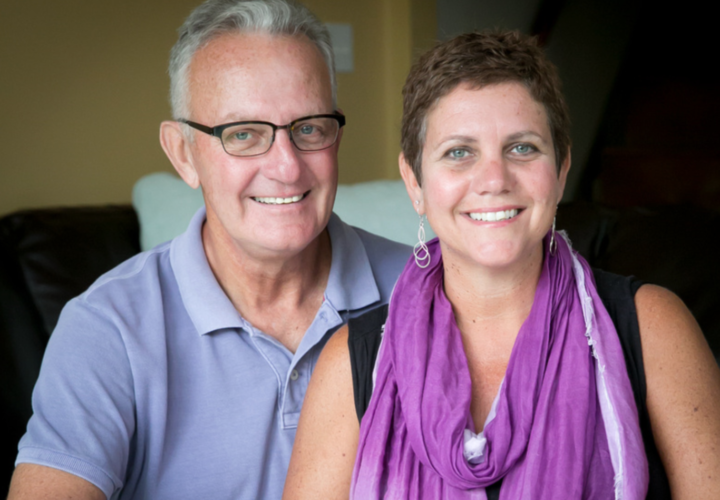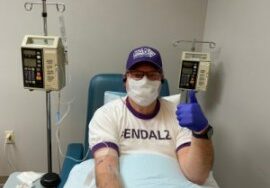Young couples facing an early-onset dementia diagnosis have a tough road ahead. A new study reveals strategies that can help — and behaviors to avoid.
People in their 50s and 60s are often working a job, perhaps in the prime of their career, and/or caring for their family. Some may be thinking ahead to retirement, planning to travel, a move to a new place, or to spend more time with family or friends. A diagnosis of early-onset dementia — dementia that becomes symptomatic before the age of 65 — can change everything instantly, altering one’s vision for the future, not to mention their immediate reality — and that of their partner or spouse.
According to Sarah Bannon, clinical psychologist and postdoctoral fellow at the Integrated Brain Health Clinical and Research Program of Massachusetts General Hospital’s Department of Psychiatry, couples facing a dementia diagnosis together are then confronted with three challenges: First, psychological interventions to help people adapt to a diagnosis often exclude those with dementia. Second, there are very few programs designed to help couples cope with such a diagnosis. Of the programs that are available for couples — like support groups — the participants tend to skew older, leaving young couples to face a difficult situation, seemingly on their own.
Bannon and colleagues, including Dr. Ana-Maria Vranceanu and Dr. Brad Dickerson, set out to identify ways to help couples navigate early-onset dementia (also called young-onset dementia) through research. In a recent study of 23 couples facing early-onset dementia published in JAMA Network Open, the team observed that many of these couples avoided discussing their thoughts and feelings with one another. Through trial and error, however, some adapted to the challenge with open communication, stress management and teamwork. The learnings from these observations, she hopes, may help light a path to creating treatments for young couples as they navigate one partner’s dementia.
“This study is the first important step towards developing psychological or psychosocial coping skills-based interventions that meaningfully include both the person living with dementia and their family care partner,” Bannon told Being Patient.
She added that recent advances in diagnostic tools have enabled more timely diagnoses of early-onset dementia, presenting a new window of opportunity for providing couples-based treatments when a person with dementia still has the capacity to engage.
Of the couples in the study, most partners were diagnosed with Alzheimer’s and frontotemporal dementia — the former being the most common type of early-onset dementia followed by the latter. Each couple participated in an hour-long interview with Bannon that included open-ended questions.
Couples tended to avoid talking about their emotions and plans for the future.
Keeping their emotions and concerns to themselves helped each partner manage their own feelings, but Bannon said it prevented couples from openly communicating about their stresses. Hoping not to burden one another, the researchers observed that couples refrained from discussing matters such as prognosis and long-term care planning.
These are difficult topics, reminders of what lays ahead, Bannon said. The future, however, is also filled with uncertainties: It’s often unclear how quickly an illness would progress and when extra care at home or transition to long-term care would be necessary.
“With the number of losses that accompany the diagnosis of the anticipated future that people would have together [and] faced with the reality that these are terminal conditions, planning for the future is something that feels very overwhelming and very, very sad,” she said. “It’s totally understandable that you wouldn’t want to have that conversation and how taking things day-by-day would actually promote your well-being in the short-term.”
Over time, however, Bannon said mutual avoidance often led to frustration and reduced intimacy, making it difficult for couples to navigate the challenges of a diagnosis collaboratively.
Through open communication, couples learned to problem-solve as a team.
Providing emotional support for one another can be difficult early in a diagnosis — a period of stress and adjustment — but Bannon said people can find the space and capacity to deal with their own distresses, making room for kindness and patience in their relationship.
“One thing that our study really highlighted is the ways of finding the balance between the loss and hardship, and also preserved meaning, positive time together and preserved relationship quality,” she said.
With time, some couples learned to openly share their views and feelings ranging from concerns about stigma and disclosing a diagnosis to friends and family, to managing symptoms, medical care and daily tasks. They found ways to navigate these difficult conversations, like deciding together when and where to have the discussions, and breaking them up into manageable sessions.
According to Bannon, open communication set the stage for couples to tackle challenges collaboratively, viewing the diagnosis as a ‘we-illness.’ As a team, couples found strategies to slow the progression of dementia symptoms (including exercising, maintaining a healthy diet, and practicing mindfulness and relaxation techniques). Ultimately, couples reported that approaching the illness with teamwork was the most significant coping strategy for helping them adjust to the challenges of a diagnosis.




no one seems to talk about the role that the parent of an early onset patient can play. I don’t see any support groups for us either. I am 86 and my 57 year old son was diagnosed four years ago. I know that there are ways in which he could be helpful to his community. But there really can only be one main caregiver and that is his wife.
I have especially appreciated hopes in new clinical trials. We just finished a trial stage three with hope of receiving it this year, but it was pulled by Cortexyme. Good news is always helpful.